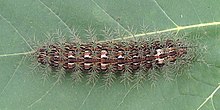Lonomia obliqua
| Lonomia obliqua | |
|---|---|
 |
|
| Lonomia obliqua caterpillar | |
| Scientific classification | |
| Kingdom: | Animalia |
| Phylum: | Arthropoda |
| Class: | Insecta |
| Order: | Lepidoptera |
| Family: | Saturniidae |
| Genus: | Lonomia |
| Species: | L. obliqua |
| Binomial name | |
|
Lonomia obliqua Walker, 1855 |
|
Lonomia obliqua (or Giant Silkworm Moth, a name also used for a wide range of other Saturniid moths) is a species of Saturniid moths from South America. It is famous for its larval form, rather than the adult moth, primarily because of the caterpillar's defense mechanism, urticating bristles that inject a potentially deadly venom. The caterpillar has been responsible for fatal disseminated intravascular coagulation, especially in southern Brazil. Its venom has been the subject of numerous medical studies.
Lonomia obliqua or Giant Silkworm Moth, a name also used for a wide range of other Saturniid moths) is a species of Saturniid moths from South America. It is famous for its larval form, rather than the adult moth, primarily because of the caterpillar's defense mechanism, urticating bristles that inject a potentially deadly venom. The caterpillar has been responsible for many human deaths, especially in southern Brazil. Its venom has been the subject of numerous medical studies.
These caterpillars are about 4.5 to 5.5 centimetres (about 2 in) long, with background colors ranging from green to brown. Well camouflaged, they have rows of tubercles crowned with whorls of easily detachable spines of different sizes.
Caterpillars of many species can cause irritation by hollow body hairs that envenom or detach easily, or can be poisonous if ingested; however, prior to investigations into Lonomia caterpillars, it was not known that caterpillars could produce toxins which in sufficient quantities could kill a human being. Lonomia obliqua is found in the south of Brazil in the states of Rio Grande do Sul, Santa Catarina, and Paraná. The species appears to be spreading to the southeast of Brazil, and recent accidents with the species were reported in the states of São Paulo, Rio de Janeiro, and Minas Gerais. L. obliqua is also found in Uruguay, Paraguay, and Argentina.
...
Wikipedia
